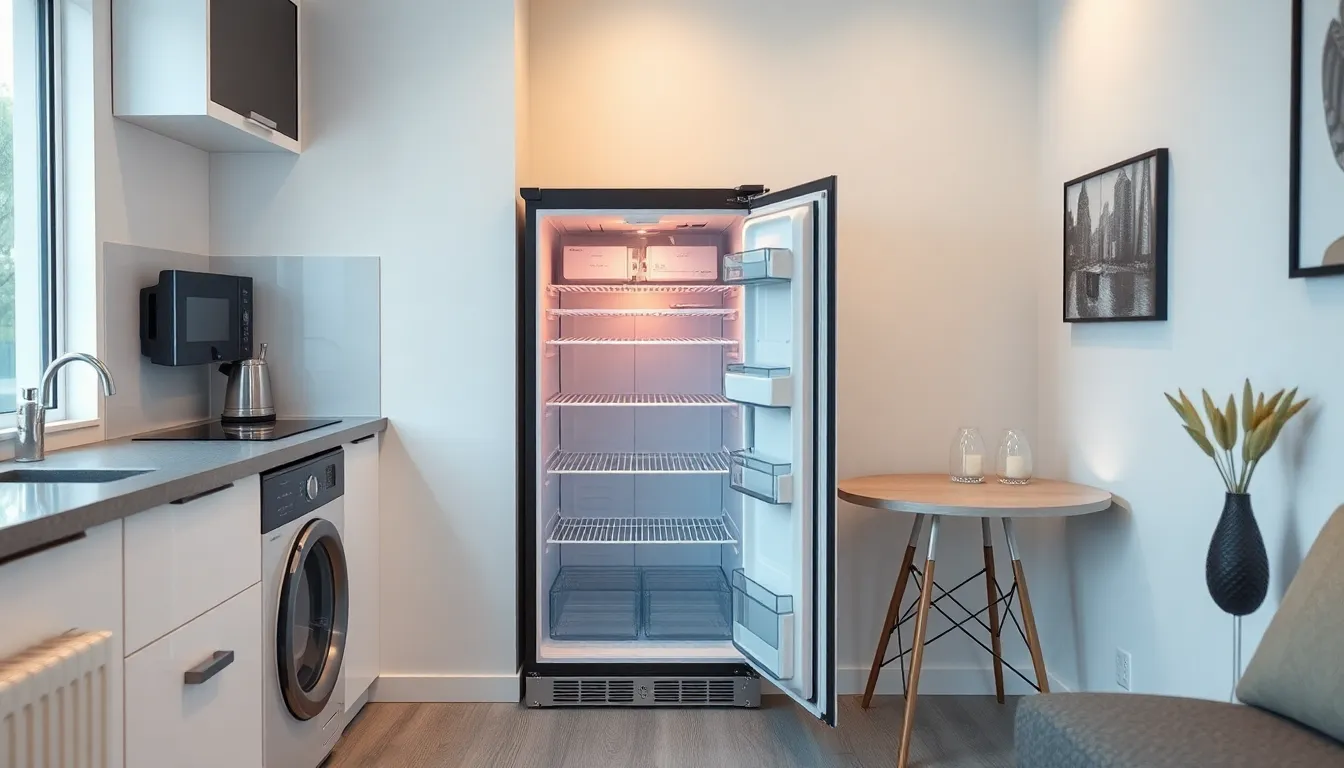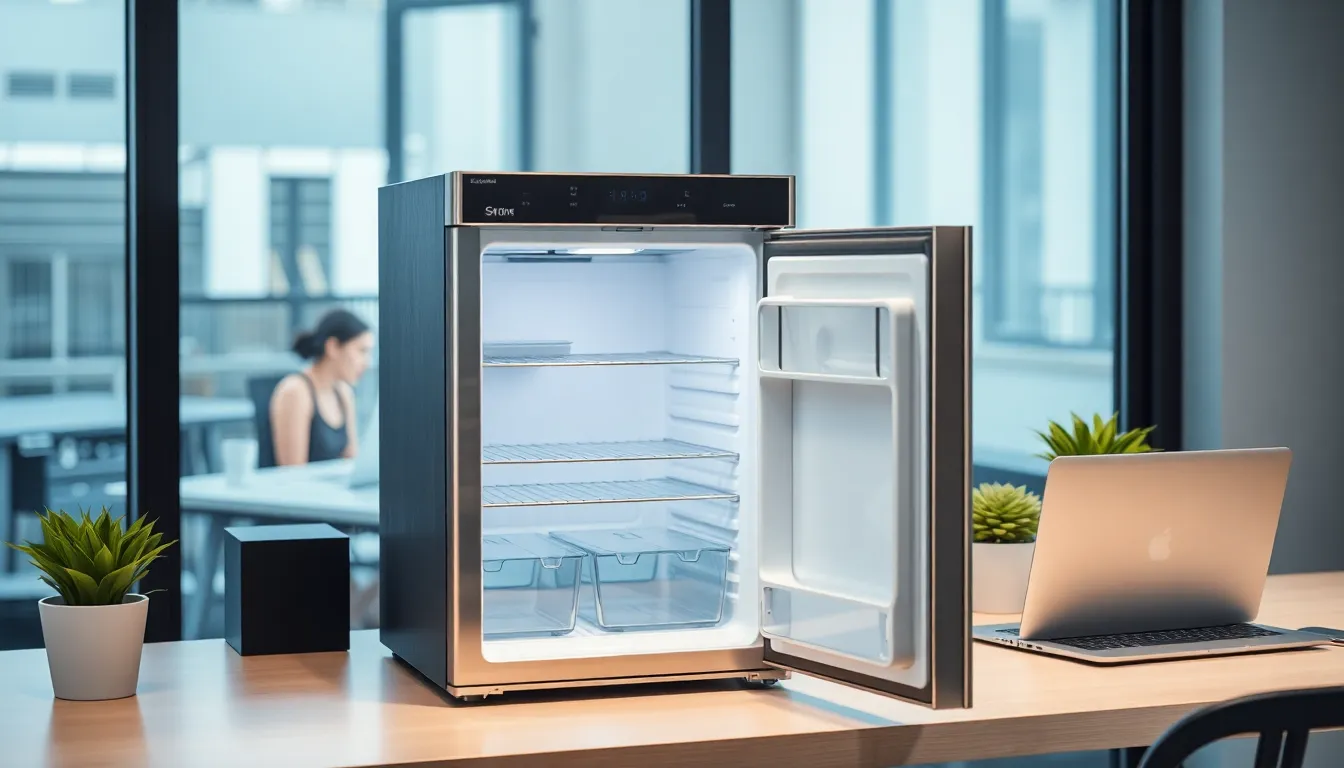Compact refrigerators have become essential appliances in today’s fast-paced world. Whether in a dorm room, office, or small apartment, these space-saving units offer convenience without sacrificing functionality. With their sleek designs and efficient cooling capabilities, compact fridges cater to a variety of lifestyles and needs.
As living spaces shrink and the demand for versatile solutions grows, compact refrigerators stand out as an ideal choice for those who want to maximize their space. They provide a practical way to store food and beverages while keeping everything easily accessible. In this article, we’ll explore the features, benefits, and considerations that come with choosing the perfect compact refrigerator for any setting.
Table of Contents
ToggleOverview of Compact Refrigerators
Compact refrigerators serve as practical solutions for those needing refrigeration in limited spaces. Typically measuring between 1.7 to 4.5 cubic feet, these units fit comfortably in small areas like dorm rooms, offices, or studio apartments. Compact designs enhance portability, allowing easy relocation within various settings while maximizing available space.
These refrigerators often feature adjustable shelves and door bins that provide flexibility for organizing different items. Energy efficiency is another significant aspect, with many models utilizing less power than standard refrigerators. This efficiency translates into cost savings on energy bills.
Common models include minibars, tabletop refrigerators, and under-counter units, catering to specific storage needs. Minibars are ideal for beverages, while tabletop refrigerators suit snacks and small meals. Under-counter units blend seamlessly into kitchen spaces, offering additional refrigeration without compromising aesthetics.
When selecting a compact refrigerator, factors like capacity, cooling technology, and intended use should govern choices. Buyers must evaluate whether a model meets their specific needs, ensuring the appliance delivers efficient performance without sacrificing valuable space.
Benefits of Compact Refrigerators

Compact refrigerators offer numerous advantages, contributing to their increasing popularity in various environments. Key benefits include a space-saving design and energy efficiency, both essential for modern living.
Space-Saving Design
Space-saving design defines compact refrigerators. These units typically measure between 1.7 to 4.5 cubic feet. Their small footprint allows placement in tight areas like dorm rooms, offices, and small apartments. Many models feature adjustable shelves and door bins, making it simpler to organize items efficiently. This flexibility lets users maximize storage potential, ensuring that every inch of available space serves a purpose.
Energy Efficiency
Energy efficiency represents another significant benefit of compact refrigerators. Many models consume less power than standard refrigerators, promoting cost savings on energy bills. According to the U.S. Department of Energy, smaller units can use about 20% less energy, enhancing sustainability. Energy Star-rated compact refrigerators meet strict energy efficiency guidelines, providing users with eco-friendly options while maintaining optimal cooling performance. These units reduce both environmental impact and operational costs, making them a practical choice.
Types of Compact Refrigerators
Compact refrigerators come in various types, each designed to meet specific storage requirements and preferences. Understanding these types helps individuals choose the best fit for their needs.
Mini Fridges
Mini fridges, often referred to as beverage refrigerators, offer versatility and convenience. Typically measuring between 1.7 and 3.5 cubic feet, they efficiently store snacks, beverages, and small food items. Mini fridges often feature adjustable shelves and compartments for optimal organization. Ideal for dorm rooms, office spaces, and workshops, these fridges plug into standard outlets for hassle-free operation. Models with glass doors are particularly popular for displaying contents, while some units have freezers for ice storage.
Cube Refrigerators
Cube refrigerators are compact, square-shaped units usually ranging from 1.5 to 2.6 cubic feet. These refrigerators provide efficient cooling in a space-efficient design, making them suitable for small apartments or tight spaces. Cube refrigerators often feature a single door and may include a small freezer compartment for frozen items. With their sleek design and minimal footprint, cube refrigerators blend well into various environments, such as bedrooms, game rooms, or dormitories. Due to their simple functionality, they serve as an economical choice for basic refrigeration needs.
Key Features to Consider
Selecting the right compact refrigerator involves evaluating several key features that determine functionality and suitability for specific needs.
Size and Capacity
Size and capacity significantly impact the refrigerator’s effectiveness in any environment. Compact refrigerators typically range from 1.7 to 4.5 cubic feet. The choice depends on available space and storage requirements. A refrigerator with a capacity of 2.5 cubic feet often accommodates small items, while a model with 4.5 cubic feet can handle larger quantities, including multiple beverages and snacks. Consideration of the unit’s dimensions ensures proper placement in limited spaces like dorm rooms or offices.
Cooling Technology
Cooling technology influences efficiency and temperature control within compact refrigerators. Most models employ either traditional compressor-based systems or thermoelectric cooling systems. Compressor systems are common in larger units and provide robust cooling capabilities, ideal for diverse food items. Thermoelectric systems, on the other hand, use fewer moving parts and maintain lower energy consumption, making them quieter and lighter. Understanding the cooling technology helps when optimizing energy efficiency and suitability for specific applications.
Noise Level
Noise level significantly impacts the usability of compact refrigerators, especially in quiet environments like offices or dorm rooms. Most compact refrigerators operate within a noise range of 32 to 45 decibels. Understanding this range helps buyers choose models that align with their noise preferences.
When selecting a compact refrigerator, consider compressor-based models, known for their cooling efficiency, typically producing 40 to 45 decibels. Alternatively, thermoelectric models deliver quieter operation, often registering 32 to 38 decibels, making them suitable for noise-sensitive settings.
Users should pay attention to product specifications when evaluating noise levels. Reading customer reviews provides insights into real-world experiences regarding noise. Additionally, some manufacturers specify noise levels in their marketing materials, aiding selection.
Model placement influences perceived noise levels as well. Positioning a refrigerator on a stable surface away from walls may reduce vibrations and noise transmission. Ensuring proper ventilation can enhance performance and minimize operational sounds.
Popular Brands and Models
Numerous brands offer compact refrigerators, each featuring distinct models that cater to varied needs. Below are two popular brands recognized for their quality and innovation in compact refrigeration.
Brand A Overview
Brand A, known for its energy-efficient appliances, offers a range of compact refrigerators that blend functionality with style. Its models typically feature a capacity of 3.2 cubic feet, making them suitable for dorm rooms and small apartments. Equipped with adjustable shelves and a separate freezer compartment, these refrigerators maximize storage versatility. Many models come Energy Star-rated, making them eco-friendly choices that help save on utility bills. Brand A also emphasizes quiet operation, with noise levels ranging from 35 to 40 decibels, making their products ideal for quiet environments.
Brand B Overview
Brand B specializes in compact refrigerators designed for both performance and aesthetics. Their models generally fall within the 2.5 to 4.5 cubic feet range, catering to various storage needs. Some models include advanced cooling technology, enhancing energy efficiency while maintaining consistent temperatures. Brand B’s units often incorporate sleek designs and additional features like adjustable temperature controls. Noise levels for these refrigerators typically range from 32 to 42 decibels, ensuring minimal disruption in offices and living spaces. With a focus on user-friendly features, Brand B continues to be a trusted choice among consumers seeking reliable compact refrigeration solutions.
Compact refrigerators are invaluable assets for those navigating limited spaces. Their efficient designs and energy-saving features cater to a variety of lifestyles and needs. Whether it’s a mini fridge for a dorm room or an under-counter unit for a small kitchen, these appliances provide flexible storage solutions without sacrificing performance.
As individuals consider their options, focusing on size, cooling technology, and noise levels will ensure they find the perfect fit. With trusted brands offering reliable models, compact refrigerators continue to enhance convenience and sustainability in modern living. Investing in the right compact refrigerator can lead to significant benefits in both functionality and energy savings.




